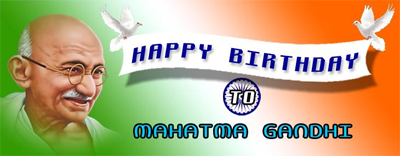|

The birth anniversary of Mahatma Gandhi, the father of the
nation, is celebrated with reverence all over the country.
He is the man who played a significant role in achiveing
independence for India from the British Empire with his
simplicity and strong will power. Mohandas Karamchand Gandhi,
also known as 'Bapu' or 'Father of the nation', was born
on the 2nd of October in 1869, in Porbunder, Gujrat. He
studied law in U.K and practiced law in South Africa. But
he left his profession and returned to India to join the
Indian freedom struggle.
Gandhiji was a preacher of truth and 'Ahimsa' (non-violence).
He started the 'Satyagraha' movement for the Indian freedom
struggle. He believed in living a simple life and in 'Swadeshi'.
He proved to the world that freedom can be achieved through
the path of non-violence. Gandhiji is a symbol of peace
and truth.
On this day, the President and Prime Minister, along with
other eminent political leaders, pay homage at Raj Ghat
- the samadhi of Mahatma Gandhi. All the offices and schools,
throughout the country, remain closed on this day.
If there was one man who was instrumental in acquiring independence
for India, it was Mohandas Karamchand Gandhi. This was the
man - slight, bespectacled and mild in manner - who controlled
the National Movement for nearly three decades. A mass leader,
he believed that he must identify himself with the masses
he leads.
History
M K Gandhi was born on October 2, 1869, in Porbandar, a
small town on the Gujarat coastline. After his early education in India, he was sent to London
where he qualified as a barrister. After attempting practice
in Bombay for a few months, he went to South Africa as counsel
for a wealthy Muslim client. Though he was supposed to return
after the case was sorted, he continued his stay there till
1914, leading the Indians there against the apartheid of
the British. His stint in India took a turn when national
leader Gopal Krishna Gokhale initiated him into the Indian
freedom movement. Gandhi, with his ideals of ahimsa, non-cooperation
and satyagraha, soon established himself as the frontrunner
in the struggle for freedom.
From then, till India gained independence, Gandhi gathered
an entire nation behind him in his relentless quest. But
Partition was a big blow to his dreams and ideals, and Gandhi
was a sad man on the night of India's Independence.
Five months after independence, Gandhiji was assassinated
by Nathuram Godse while on his way to his daily prayer meeting.
The 78-year-old Father of the Nation had left a country
that was just discovering its feet, orphaned. His birthday
was recognised as a National holiday.
Gandhi was not just a political leader. In fact, he was
never a keen politician. He was a leader of the masses and
always identified himself with them. All his actions had
the power to galvanise the people. When others walked out
of the Assembly in protest, Gandhi walked 100 km to the
sea at Dandi to make salt illegally.
In short, he would take a step that would involve the millions,
a small step by itself, but which would magnify a million-fold.
The British often wondered what it was about Gandhi that
attracted so many to him. But the people had no such questions.
They understood the way in which he identified with them.
In fact, Gandhi took pains to learn to sign his name in
all the major Indian languages.
Gandhi was also deeply spiritual, and believed that all
religions showed the way to ultimate enlightenment. He also
wrote a commentary on the Bhagavad Gita, a book that influenced
him deeply.
Gandhi is also revered for his absolute belief in truth
and ahimsa. It is this man's birthday that we celebrate
as the birth anniversary of the Father of the Nation. His
tolerance for other religions and support for the downtrodden
are recognised and honoured on this day.
Celebration
Mahatma Gandhi was a simple man, with simple tastes and
high values. Respecting that, even though Gandhi Jayanti
is a national holiday, the festivities are minimal.
A prayer meeting is held at Rajghat, Gandhi's samadhi in
New Delhi. To mark the respect that Gandhi had for all the
religions and communities, representatives from different
religions take part in it. Verses and prayers are read out
from the holy books of all the religions. Gandhi's favourite
song, Raghupati Raghava, is invariably sung at all the meetings
associated with him. Prayer meetings are held in various
state capitals as well. Gandhi Jayanti is observed all over
the country, both in government and non-government forums.
|